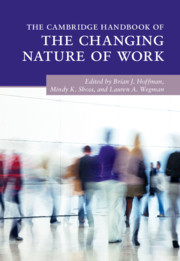Book contents
- The Cambridge Handbook of the Changing Nature of Work
- The Cambridge Handbook of the Changing Nature of Work
- Copyright page
- Contents
- Figures
- Tables
- Contributors
- Part I Introduction to the Changing Nature of Work
- Part II What Has Changed?
- 4 Changes in Technology
- 5 The Changing Nature of Work
- 6 Changes in Occupations, Jobs, and Skill Polarization
- 7 Changes in the Legal Landscape
- 8 The Rise and Decline of Organized Labor in the United States
- 9 Changes in Organizational Income Inequality
- 10 Work and Employment in Fluid Organizational Forms
- 11 Changes in Worker Demographics
- 12 Generational Changes in Personality, Values, and Abilities
- 13 Changes in Work Behavior Patterns
- Part III Implications for Talent Management and Impact on Employees
- Index
- References
5 - The Changing Nature of Work
A Global Perspective
from Part II - What Has Changed?
Published online by Cambridge University Press: 02 April 2020
- The Cambridge Handbook of the Changing Nature of Work
- The Cambridge Handbook of the Changing Nature of Work
- Copyright page
- Contents
- Figures
- Tables
- Contributors
- Part I Introduction to the Changing Nature of Work
- Part II What Has Changed?
- 4 Changes in Technology
- 5 The Changing Nature of Work
- 6 Changes in Occupations, Jobs, and Skill Polarization
- 7 Changes in the Legal Landscape
- 8 The Rise and Decline of Organized Labor in the United States
- 9 Changes in Organizational Income Inequality
- 10 Work and Employment in Fluid Organizational Forms
- 11 Changes in Worker Demographics
- 12 Generational Changes in Personality, Values, and Abilities
- 13 Changes in Work Behavior Patterns
- Part III Implications for Talent Management and Impact on Employees
- Index
- References
Summary
The changing nature of work is both a local and global phenomenon. Globalization has enabled individuals with skills and talents to work in knowledge-intensive cities where they can interact with one another. The competencies rewarded by global organizations require global acumen, multicultural fluency, technological literacy, entrepreneurial skills, and the ability to manage in increasingly far-flung, de-layered, disaggregated organizations. A different sort of social structure is needed to support this type of worker. There is a shortage of such individuals in specific sectors and a global effort to find, develop, and retain talented workers who can move organizations forward. This chapter will look at recent research on the globalized workforce with an effort to understand the development, recruitment, and training of talent to implement strategic or technological innovation. We will look at current research on global talent management, HR management and organizational behavior as it relates to global work, and growing restrictions on the free flow of global work. Will we continue to see further extension of the globalized workforce, or enter a new era of privileged access to markets based less on workplace talent than on citizenship, ethnicity, religion, and other factors?
Keywords
- Type
- Chapter
- Information
- The Cambridge Handbook of the Changing Nature of Work , pp. 101 - 132Publisher: Cambridge University PressPrint publication year: 2020
References
- 1
- Cited by

